Israel

Jan. 27 is International Holocaust Remembrance Day, the date the United Nations has chosen to commemorate victims of the Holocaust during World War II. Six million Jews were murdered by Germany’s Nazi regime, along with 5 million non-Jews who were killed. The anniversary, marked each year since 2005, falls on the anniversary of the liberation of the Auschwitz-Birkenau death camp in Poland by the Russian army in 1945. One million people died there.
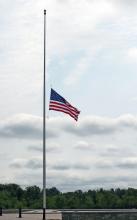
On Dec. 28, just before New Year’s Day, a Cleveland grand jury declined to indict the officers who killed Tamir Rice, a 12-year-old boy who had been playing with a toy gun in a park near his home. For many, the news resounded as yet one more tragic refrain in the long litany of our nation’s utter disregard for Black lives. Extinguished in the innocence of childhood, without even a second thought.

As France marks the anniversary of the terrorist shootings that targeted a kosher supermarket and a satirical weekly, a new report warns anti-Semitism here continues to rise, taking a myriad of underreported forms.
“Violence targeting Jews and Jewish sites has led to a heightened sense of insecurity, and an increasing number of Jews are relocating in or outside France for security reasons,” U.S. advocacy group Human Rights First wrote in a report published Jan. 7.

The Palestinian Authority has asked municipalities to tone down their public Christmas celebrations this year amid escalating violence between Palestinians and Israelis.
Hana Amireh, who heads a government committee on churches in the West Bank, confirmed the Palestinian Authority is requesting “a certain decrease” in festivities following the deaths of dozens of Palestinians since mid-September. The majority of them were killed during clashes with Israeli forces or carrying out terrorist attacks, according to the Israeli government.
Amireh said the government has asked the municipality of Bethlehem, the town where Jesus was born and where official Palestinian celebrations of Christmas take place, not to set off holiday fireworks this year and to limit the festive lights and decorations that traditionally adorn the town to two main streets.

The head of a national Republican Jewish activist group predicted on Nov. 10 that dissatisfaction with the Iran nuclear deal will increase the GOP's share of the Jewish vote in 2016. His Democratic counterpart argued that Jewish Americans, who overwhelmingly vote for his party, are divided over the deal and prioritize other issues.
The debate took place at one of the largest annual gatherings of Jewish activists in the world — the General Assembly of the Jewish Federations of North America — just hours before an address to the group by Israeli Prime Minister Benjamin Netanyahu.
“I say it with a broken heart and a lot of sadness,” said Republican Jewish Coalition Executive Director Matt Brooks on what he alleged is flagging Democratic support for Israel in recent years.

WALTER BRUEGGEMANN is a leading authority of Old Testament interpretation and author of more than two dozen books. In this book he seeks to make a contribution to the application of biblical concepts of God’s chosen people and the promised land in the light of the contemporary Israeli-Palestinian conflict.
This book is slim, focused on the social justice issues and the relevance of key readings of Hebrew scripture to this conflict. It is written to be a manual for group discussions, particularly by Christian groups in churches. Brueggemann focuses on three main themes and their roots in scripture: the meaning of the “God’s chosen people,” the donation of the “holy land” to the “chosen people,” and the relation of Zion and Israel.
The “chosen people” are chosen by God as an arbitrary decision, writes Brueggemann, not based on any superiority of that people to others, but only on God’s love for them. It is an unconditional decision by God to choose this people with whom to have a special relationship. Yet this idea evolves in Israel’s history. There develops the theme that the people of Israel will be held especially accountable by God because of this relationship and punished for their iniquities (Amos 3:2). Isaiah suggests that, in a redemptive future, Egypt and Assyria will be chosen alongside Israel as a “blessing in the midst of the earth” (Isaiah 19:24-25).
Later heirs of the biblical tradition reinterpreted the idea of the chosen people to apply to themselves. Some in the Christian church saw itself as inheriting the status of God’s chosen people. Some in the United States regard this nation as a chosen people, occupying a new “promised land.”

THE IMAGE OF Palestinian teenagers pulling out knives and attempting to stab heavily armed, flak-jacketed Israeli soldiers—or civilians, right in front of the soldiers—serves as a sad metaphor for Israel-Palestine these days. The desperation, the futility, the massive disproportionality of firepower—it’s all there.
Of course, what really happened in recent violent incidents is subject to contentious dispute, as is so much else in the region. Take, for instance, a mid-October clash in East Jerusalem. The Israeli police gave their version of events: Border police officers confronted a Palestinian man, who pulled a knife and tried to stab them. They fired at him to “neutralize” the attack, and he died of his injuries.
The Palestinian News and Information Agency’s version added significant details: The “man” killed by Israeli soldiers was actually a 16-year-old named Muta’az Owaisat, and the agency reported that the police quickly imposed a military cordon to keep journalists from the scene, near an “illegal Israeli settlement.” The report added, “Earlier Saturday, an 18-year-old Palestinian ... was shot by an Israeli setter in central Hebron, in the southern Western Bank, where he was left to die by Israeli soldiers who prevented paramedics from administering medical assistance to him.”
An anecdote in The Washington Post illustrated the senselessness of the violence: “As an atmosphere of fear and vengeance spread, a young Jewish Israeli stalked an Ikea parking lot in Kiryat Ata, a town in northern Israel, apparently looking for Arabs to attack,” the Post reported. “He repeatedly stabbed a man who turned out to be Jewish himself.”
A lot of ink is spent explaining what “caused” these latest outbreaks—it’s usually summarized as Israel’s attempts to restrict Palestinians from entering the area of East Jerusalem that houses the al-Aqsa Mosque (and the Temple Mount). But in some ways, looking for a single precipitating cause misses the point. Sometimes, such eruptions are simply a case of a people saying, “I’m not going to take this anymore.”
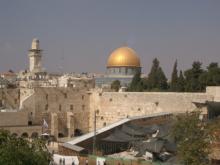
In a bid to defuse the wave of Palestinian violence that has struck Israel and the West Bank during the past few weeks, Israeli Prime Minister Benjamin Netanyahu on Oct. 8 prohibited all of the country’s parliamentarians from visiting the Temple Mount, a contentious site holy to both Jews and Arabs.
Netanyahu made the controversial decision in order to quell Muslims’ fears that Israel was preparing to assert sovereignty over part or all of the Mount, the site of the Al-Aqsa Mosque and Dome of the Rock, and the long-destroyed Jewish Biblical Temples. Netanyahu has long denied such intentions.
Far-right-wing Jews, including Israeli agricultural minister Uri Ariel, say Jews should have the right to pray at Judaism’s holy site, and some have vowed to build a Third Jewish Temple on the Temple Mount. Arab leaders, including Palestinian President Mahmoud Abbas, have said such a move would result in a regional war against Israel.
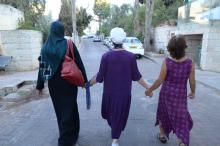
An interfaith group gathered in a private home Sept. 21 to head off potential tensions over how Jews and Muslims celebrate Yom Kippur and Eid al-Adha, two holidays that overlap this year.
The meeting of the Abrahamic Reunion took on added significance in Jerusalem, where more than a week of violent clashes between Israelis and Palestinians on the Temple Mount have spilled into the streets of East Jerusalem.
Two dozen people of various faiths heard a rabbi explain the laws and traditions of Yom Kippur, the Jewish Day of Atonement, and a Muslim sheikh explain the laws and traditions of Eid al-Adha, the Muslim holiday that honors the willingness of Ibrahim (the biblical Abraham) to heed God’s order to sacrifice his son.
The day culminated with an interfaith peace walk between the eastern and western parts of the city. Israel captured East Jerusalem in 1967 and considers it part of its capital. The Palestinians say East Jerusalem must be the capital of a future Palestinian state.
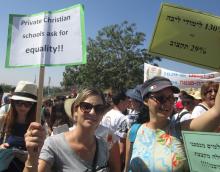
Israel’s 47 Christian schools are entering the second week of an open-ended strike to protest ongoing cuts in government allocations, which they attribute to government discrimination against minority religious groups.
The schools, 40 of them Catholic, teach 33,000 Christian and Muslim Arab students in central and northern Israel.
Officials from various Christian denominations called the strike on Aug. 31, after nearly two years of negotiations with the Ministry of Education failed to convince the government to reinstate the funding it has withdrawn from the country’s semi-private schools during the past six years.

Emmy-winning actress and neuroscientist Mayim Bialik isn’t afraid to speak out about her sometimes-unconventional social views, from writing a book about attachment parenting to criticizing hyper-sexualized celebrities in a recent essay.
Now, she’s talking candidly about religion in entertainment, claiming that “it’s never going to be trendy to be observant or religious in Hollywood circles” in an interview with FOX411.
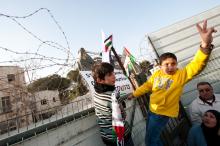
When my wife, Karen, and I lived in Jerusalem, we awakened each morning to see the rising sun shining on the Mount of Pentecost. It is the traditional site of the coming of the Holy Spirit (Acts 2), the Upper Room, and King David’s tomb.
The power of that image remains in our consciousness. But even more compelling was the view from our hillside terrace where we had breakfast and entertained our friends. Below, between our home and the holy “mountain” 100 yards across the Hinnom Valley, was the still garbage-strewn site of the Moloch cult’s altar where babies were sacrificed to the presumed angry Israeli god — a place condemned as cursed, with no buildings for 2,500 years.
The contrast was always startling. Land, hills, trees, military power, and false religion have become the idolatrous substitute for God himself, as church historian Martin Marty has noted. And the fact is that “children” such as Rachel Corrie, Israeli soldiers, Palestinian stone throwers, and totally innocent little infants are dying daily, as contemporary sacrifices to an idolatrous god.
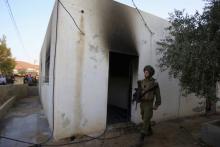
Elhanan Shmidov views this illegal Jewish outpost, within earshot of the drumming ceremonies of nearby Palestinian villages, as the epitome of "self-sacrifice," where "good Jews" like him carry out the holy mission of populating this contested land.
Shmidov, like many of his neighbors, said residents must defend their place in communities like his throughout "Judea and Samaria," the biblical name referring to land that was once the domain of the ancient Jewish kingdom. He takes no responsibility for the Jewish extremists — whom he calls "wild weeds" within the pro-settler community — who carry out violence against Palestinians.
The increasingly radical Jewish militants who target Palestinians are the latest front in Israel’s struggle against terrorism. Israeli security authorities estimate hundreds belong to the extremist groups, but only about 100 have been involved in the violent attacks.
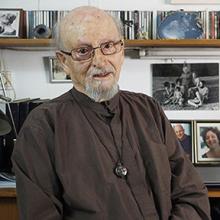
TUVIA RUEBNER HAS earned the lament he wrote for King David, Israel’s better-known sorrow bearer. The poet came into the world 91 years ago in Pressburg-Bratislava, Slovakia, under Nazism’s shadow. It is a shadow he managed to separate himself from physically, but which sticks to him philosophically and is at the core of his poetry. The parched sound of random loss is the root sound in many of his poems. The spawn of an unimaginable yesterday, Tuvia Ruebner is more than anything a poet of today.
His parents, his grandparents, and his little sister Litzi all perished at Auschwitz in 1942, a year after he immigrated to British Mandate Palestine. Forty years after their deaths, Ruebner’s first son, Moran, was sent to fight in Israel’s first Lebanese war. Moran left for South America the following year, estranged from his country and its wars, and after a few letters, was never heard from again.
In Ruebner’s poem “[My father was murdered],” one by one he enumerates his losses:
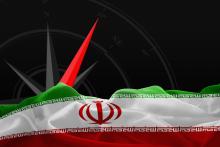
If politicians are letting one person trump the tone of politics, just to go up in the polls or get on the debate stage, that’s very bad news for our nation’s civil discourse.
It certainly isn’t serious talk. Serious talk is “Hard work.” “Difficult negotiations.” “Competing interests.” “Coalitions and diplomacy.” Serious talk recognizes that no agreement, no matter how diligently negotiated, is perfect.
Iran is an enemy – an enemy of America, an enemy of Israel, and an enemy of peace. I believe that. But you need to find ways to make peace with your enemies in order to reduce potential conflict. Choosing war with our enemies as our first option since 9/11 has just made us more enemies.
The question is: what we should do about Iran?
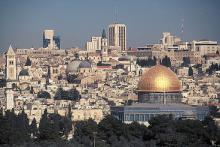
The Supreme Court on June 8 declined to insert itself into the middle of the Israeli-Palestinian issue by second-guessing U.S. policy on Jerusalem.
Ruling just a few months after a feud between President Obama and Israeli Prime Minister Benjamin Netanyahu, the justices refused to allow Americans born in Jerusalem to have their passports changed to reflect Israel as their birthplace, as Congress demanded more than a decade ago.
In denying the challenge waged by the Jewish parents of a 12-year-old almost since his birth in 2002, a majority of justices heeded the State Department’s warning that a simple passport alteration could “provoke uproar throughout the Arab and Muslim world.”
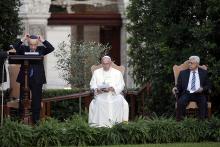
The Vatican’s decision to recognize Palestine as a sovereign state on May 13 angered Israeli officials.
The move comes four days before the first-ever canonization of two Palestinian nuns and it solidifies the standing of Palestinian President Mahmoud Abbas, who is scheduled to meet with Pope Francis at the Vatican on Saturday.
Israeli Foreign Ministry spokesman Emmanuel Nahshon told The Times of Israel that the government is “disappointed by the decision. We believe that such a decision is not conducive to bringing the Palestinians back to the negotiating table.”
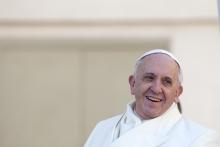
The Vatican announced it will recognize the state of Palestine in a treaty concluded May 13.
The treaty is awaiting formal approval and signing, but it is already being recognized as a major statement of support for a Palestian state in the historically contested region.
The pope has long signaled his support of a state. The language of the treaty, while not yet signed, has alarmed Israelis but invigorated the Palestinian case for statehood, The New York Times reports.
For the past year, the Vatican had informally referred to the country as “state of Palestine,” in its yearbook as well as in its program for Francis’ 2014 visit to the Holy Land.
Formal recognition of a Palestinian state by the Vatican, which has deep religious interests in the Israeli-occupied Palestinian territories that include Christian holy sites, lends a powerful signal of legitimacy to the efforts by the Palestinian Authority’s president, Mahmoud Abbas, to achieve statehood despite the long paralyzed Israeli-Palestinian peace process.
Read more from The New York Times here.

Amid a heated debate over his vocal opposition to homosexuality and same-sex marriage, Atlanta pastor Charles Stanley will decline an award he planned to accept from the Jewish National Fund in Atlanta on April 23.
News that the longtime pastor of First Baptist Atlanta and former president of the Southern Baptist Convention would be honored by the JNF angered many Jews who pointed to his history of vitriolic anti-gay comments.
Stanley said the award was causing too much strife within the Jewish community, and for the sake of his love for Israel, he would not accept it, according to the JNF, a nonprofit that sponsors environmental and educational programs in the Jewish state.
It was Stanley’s idea not to accept the award, JNF spokesman Adam Brill said Tuesday.
“Dr. Stanley feels that he did not want to see any further controversy and I think it’s a laudable and heartfelt decision, and we totally support and embrace it.”
Decrying Stanley’s “sordid history of virulent homophobic statements and actions,” the Southern Jewish Resource Network for Gender and Sexual Diversity (SOJOURN) led a campaign to get JNF to change its mind on bestowing Stanley with its Tree of Life award, which was to be given to him for his support for Israel by the JNF’s Atlanta chapter on Thursday, Israel’s independence day.
“We respect Dr. Charles Stanley’s decision,” said Rebecca Stapel-Wax, executive director of Atlanta-based SOJOURN, on Tuesday.
“We are so grateful for the strong support of hundreds of people across the country. We look forward to a productive dialogue with JNF in the coming weeks and building our relationship together to support the local Jewish and LGBTQ communities and Israel.”
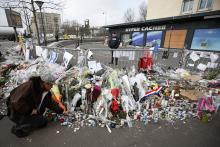
The number of violent anti-Semitic attacks around the world surged nearly 40 percent last year, according to a report released April 15 by researchers at Tel Aviv University in Israel.
The report found there were 766 recorded incidents against Jewish people in 2014 — the worst year for attacks since 2009. It was released ahead of Israel commemorating Holocaust Remembrance Day, which began April 15 at sundown.
The attacks were “perpetrated with or without weapons and by arson, vandalism, or direct threats against Jewish persons or institutions such as synagogues, community centers, schools, cemeteries, and monuments as well as private property,” the authors of the report, based at the Kantor Center at Tel Aviv University, said.
In 2013, there were 554 registered incidents.